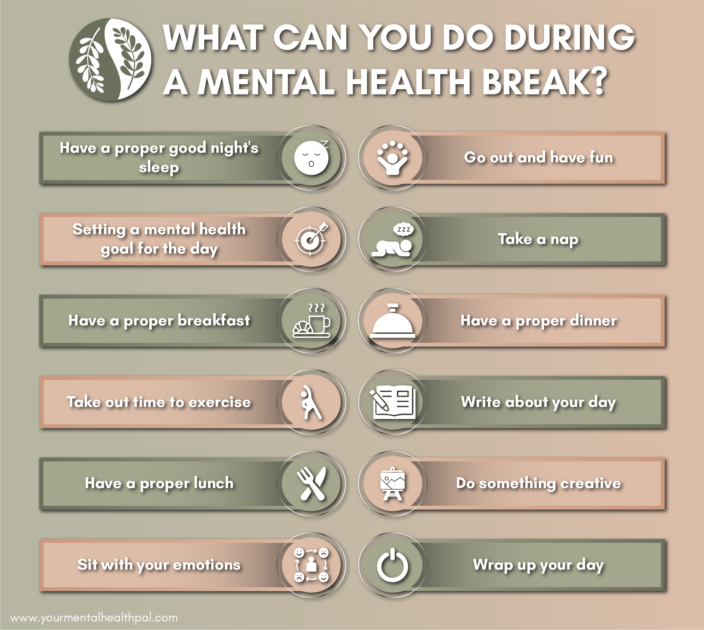Finally, a day off! Happy right?
Want to feel good and relaxed?
Take a mental health break.
What? Why? How? You may Ask.
Sit back, and we will help you understand,
What is a mental health break?
Why is mental health break important?
How to take a mental health break?
Mental health break is about letting your body, mind, and soul relax and energize yourself from all the stress of work and life you have bottled up. It is usual for some of us to think we don’t need a mental health break. But hold that thought.
Let’s first look at what is a mental health break and the symptoms of a mental breakdown.

What is a mental health break?
Something that enables you to step back, unwind, and refocus your thoughts qualifies as a mental health break. Everyone can benefit from taking breaks for their mental health, based on what refreshes them.
Some mental health breaks may include a weeklong vacation, while others may only last for 10 minutes. In a perfect world, you’d probably get a combination of the two, taking short breaks frequently to keep you going throughout the week and longer intervals to let you reset more deeply.
Do I need a mental break: Signs of A Mental Breakdown
1. You are feeling restless
Never feeling rested is one of the most significant indicators that you may take on too much. You may need to take more breaks at work or hurriedly switch between projects without pausing.
When you try to unwind, you find it difficult to remain still or quiet your mind. When you most need to recharge, it could be challenging.
2. You are not sleeping well
The foremost thing that disrupts when you’re anxious or overwhelmed is your sleep cycle. Take note if you find yourself staying up later than usual to complete a task or if you start waking up at strange times and finding it difficult to get back to sleep.
Additionally, you can be experiencing sleeplessness if you’ve experienced significant distress or issues with your ability to function due to sleep disorders for at least three evenings a week for at least three months.
3. You are not eating well
A strong indication of when you need to take a break is when your eating habits change.
Sometimes you may become aware that you are skipping meals or eating less than normal. Alternatively, you can discover that you’re eating more than normal and always looking for a snack, even when you’re not hungry. Both situations might indicate stress.
4. You lack motivation
Burnout symptoms include dragging oneself to work or losing interest in activities you once found enjoyable.
You used to be the one who organized social activities at work, but you no longer have the drive. Activities you once enjoyed may become tedious chores you only complete out of obligation when stressed.
5. You feel sick all the time
Frequent illness could be an indication that stress is weakening your immune system. Stress might make it harder for your body to fight off infections.
6. You feel tired and exhausted all the time
Excessive stress can leave you mentally and physically weary even after getting nine hours of sleep.
Leaving the house in the morning can take an extra ten minutes. Or even if nothing has changed, your routine workout feels more challenging.
7. You have been trying sedatives
Do you make yourself a quick drink when you get home from work? Perhaps carry cannabis in your back pocket for the trip home?
There is nothing wrong with occasionally doing this, but be careful not to use drugs or alcohol as a coping mechanism for stress.
Why is mental health break important?
Mental health breaks are an essential part of our lives. If we think we don’t need breaks, we might over-exert ourselves, leading to bad mental and physical health and disrupting our day-to-day life. Here are some reasons you should consider taking a mental health break.
1. A mental health break relaxes your body and regulates your stress and frustration. Chronic stress results from accumulated stress which you tend to ignore and never take the time to decompress. This stress can affect your mental health in the long run. Therefore, taking breaks to reflect on your thoughts is essential.
2. Breaks are an excellent opportunity to change your routine and do something you love to feel better and fresh. This will also help you enhance your creativity and productivity.
3. Breaks are all about hanging out with your loved ones. In our busy schedules, we don’t get the time and opportunity to sit with our friends and family. So if you are on a break, have a cup of tea and talk your hearts out with your loved ones.
4. A mental health break is an excellent time to get up and move around, especially if you spend the entire day in front of a computer. Moving even a little bit every hour can have significant long-term advantages and aid in preventing more severe conditions, including obesity, heart disease, diabetes, and depression.
5. During a mental health break, you can consolidate what you’re learning or working on. Allowing your mind some downtime enables it to examine and internalize what you just learned, which will improve your memory.
6. Taking care of your physical and mental health is critical to improving your productivity, which is affected by various factors. You can utilize your break to practice self-care activities, which will help your mental and physical health and make you happier.

What can you do during a mental health break?
1. Have a proper good night’s sleep

Getting a good night’s sleep is the first important step in taking care of your mental health, which is frequently neglected. Therefore, give yourself at least 8 hours of sleep the night before your mental wellness day.
If you have trouble falling asleep, consider setting aside as much as 9 to 10 hours because disruptions during the night may cause you to feel weary all day.
2. Setting a mental health goal for the day
Start your day with some motivation as you get up in the morning. Before diving into the world of catching up on the news, or answering calls and emails, start your day by making objectives or goals to help you feel balanced and grounded. Set the tone for yourself by taking a moment to consider the objectives you hope to accomplish today.
3. Have a proper breakfast

Make yourself a healthy breakfast after you’ve taken the time to set your goals. This typically denotes a varied breakfast. I’m sorry, but a donut and coffee just won’t do.
A filling breakfast might enhance your mood and mental function all day. There are even breakfasts for people who experience signs of depression. It is not advised to skip breakfast entirely. It has been demonstrated that those who consistently eat breakfast tend to be happier, respond to stress less, and live healthier lives overall.
4. Take out time to exercise

The next best action is to get some light activity when your breakfast has settled. A low-impact workout like stretching or yoga might help loosen up stiff muscles from the previous night’s sleep, but if you’re feeling full, you may want to avoid strenuous cardio.
Your heart rate, blood pressure, and susceptibility to daytime stress can all be reduced with exercise.
As soon as you’re through, remember to take care of your daily maintenance, including taking a shower and brushing your teeth, to help you feel revitalized and fresh.
5. Have a proper lunch

Eat a healthy lunch. Leafy greens can help delay cognitive decline and may even prevent dementia over the long term, so now is an excellent time to incorporate them into your diet.
Your lunch keeps you energized throughout the day. Even if you are busy and packed with work, take some time out and have your lunch peacefully.
6. Sit with your emotions
Explore some of the emotional problems you’ve been experiencing. What will you do to combat the worries you experience every day? How would you contact your manager to follow up after a mistake at work?
If you want to get some rest and sleep, you should do some problem-solving reframing now. Otherwise, you might spend the entire evening doing this.
7. Go out and have fun

Spend time re-establishing contact with family and friends. Going out with your friends on a bike ride or visiting your relatives are excellent ways to socialize and improve your mental health.
Being mentally healthy requires regular interpersonal touch. Social anxiety and sadness, among other mental health issues, are linked to social isolation.
8. Take a nap

It has long been established that naps improve mental function. Just keep it short, so it won’t interfere with your nightly sleep.
If you don’t like napping, this is an excellent time to focus on what makes you happy. That could entail anything from reading a book to getting more exercise or even engaging in some form of meditation. Whatever you decide, just remember to take advantage of that time for yourself.
9. Have a proper dinner
Eat a lighter meal for the evening. You may lose weight, improve your glucose levels and metabolism, sleep better, and feel more energetically balanced if you eat less at night. And we are all aware of how challenging it may be to stay healthy.
10. Write about your day

Set aside some time to journal or reflect on the day’s events. You may boost positivity and tranquility before night by using the GLAD technique, a thankfulness exercise that can enhance your mood.
The GLAD technique is a way of paying attention to certain positive aspects of life. You can journal about:
- Gratitude: Anything that you are thankful for.
- Learned: Something you learned about yourself.
- Accomplishment: Something you accomplished today.
- Delight: Anything that made you feel happy and joyful.
11. Do something creative

Find a creative outlet that motivates you, whether reading, writing, music, painting, or drawing. Anything goes as long as it encourages creativity and clears your head. This will provide you the opportunity to freely produce something without worrying about receiving criticism if you’re feeling worn out from your regular workload.
Try doing something you have never done before. This is an excellent mental exercise if you want a hilarious memory to go back on or feel stuck at work.
12. Wrap up your day
Spend time with your family, read a beloved book in the tub, or binge-watch that new movie. Take advantage of this opportunity to reflect on your mental health day and list some of the things that went well. This might inspire you and serve as a helpful reminder of the significance of mental health days for us.
Takeaway:
We should understand what is a mental health break and why it is essential in our life. We are constantly running with stress and frustration and don’t even have five minutes on our hands for ourselves. It’s not wrong to be engaged in our job and lives, but taking a break is advised before this hectic schedule starts affecting our mental and physical health.
A mental health break doesn’t mean you sleep the whole day and be lazy; instead, it’s a day to charge yourself up for the upcoming hardships and give your mind the needed motivation and relaxation. Utilizing your mental health break properly is very important. It’s your day; enjoy it as much as you can. Be happy, give yourself credit for all your achievements, and accept that you deserve this mental health break.

